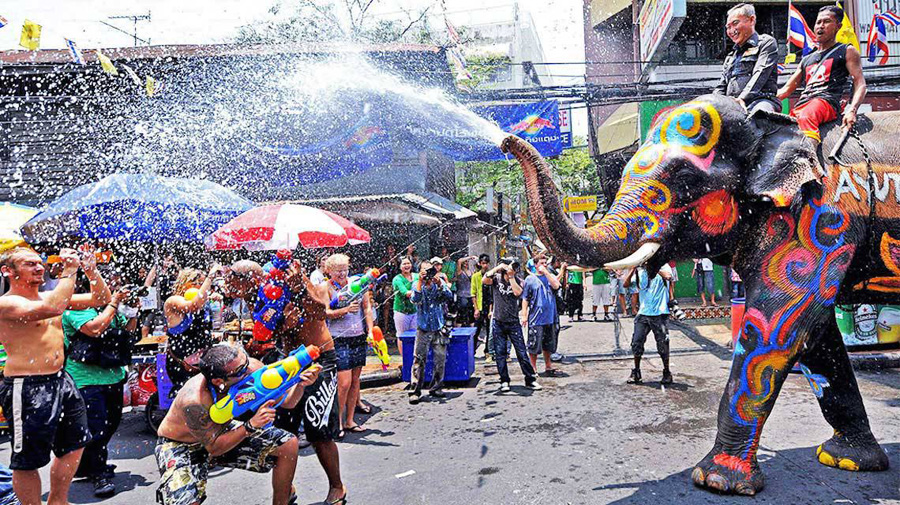Songkran (สงกรานต์) is the traditional Thai New Year festival, celebrated annually from April 13 to 15. Recognized for its grand water fights, cultural rituals, and community gatherings, Songkran marks a significant period in Thai culture — a time for renewal, family reunion, and religious devotion.
Though Thailand officially adopted the Gregorian calendar in 1940, making January 1 the official New Year’s Day, Songkran remains deeply respected and widely celebrated as the “Traditional Thai New Year.”
Meaning and Etymology
- Songkran derives from the Sanskrit word “Sankranti”, meaning “astrological passage” or “movement/change.”
- It marks the sun’s transition into the Aries zodiac, signifying the start of a new solar year in many traditional Asian calendars.
- It symbolizes change, purification, and new beginnings.
Historical Background
Ancient Origins:
- India and Hindu Influence:
The roots of Songkran trace back to ancient Indian solar New Year celebrations. The concept of celebrating the sun’s movement is connected with Hindu astrology and traditional calendars. - Spread to Southeast Asia:
Through trade, migration, and religious influence, the festival concept spread from India to Thailand, Myanmar, Laos, and Cambodia. - Integration into Thai Culture:
Songkran merged with Buddhist beliefs and Thai traditions, becoming a unique festival symbolizing respect, merit-making, and purification.
Traditional Practices and Customs
1. Water Pouring Ceremonies (Rod Nam Dam Hua)
- Originally, people gently poured scented water over the hands of elders and family members to ask for blessings and forgiveness.
- This act is a sign of respect, humility, and wishing good fortune.
2. Temple Visits (Wai Phra) and Merit-Making
- Thais visit Buddhist temples (wats) to make merit by:
- Offering food to monks
- Releasing birds or fish as a symbol of setting free negative karma
- Pouring water over Buddha statues for spiritual cleansing
3. Sand Pagoda Building (Chedi Sai)
- Locals bring sand to temples and build small sand pagodas.
- These are decorated with flags and flowers, symbolizing merit-making and giving back to the temple community.
4. House Cleaning and Purification
- Homes are cleaned thoroughly to get rid of bad luck from the old year.
- Statues and images of Buddha are respectfully washed.
5. Family Reunions and Paying Respects
- Songkran is a time for family gatherings.
- Younger generations perform Rod Nam Dam Hua for their elders, expressing gratitude and seeking blessings.
Modern-Day Celebrations
1. Water Fights and Street Festivals
- What began as a gentle ritual has evolved into massive public water fights in cities like:
- Bangkok (Khao San Road, Silom Road)
- Chiang Mai (Tha Pae Gate)
- Phuket (Patong Beach)
- Tourists and locals use:
- Water guns
- Buckets
- Hoses
- Even elephants spraying water in traditional areas!
2. Cultural Shows, Beauty Contests & Parades
- Songkran features:
- Traditional dance performances
- Parades of Buddha images
- Beauty pageants (Miss Songkran)
- Folk music and cultural exhibitions
3. Night Markets and Food Festivals
- Cities host night markets, offering:
- Traditional Thai food
- Handicrafts
- Cultural items
Songkran’s Religious and Social Significance
- Water Symbolism:
Represents purity, cleansing, and the washing away of sins, misfortune, and negativity. - Merit-Making and Spiritual Cleansing:
A time for spiritual reflection, making merit, and strengthening community ties. - Social Harmony:
Encourages respect for elders, bonding among families, and community participation.
Regional and International Influence
Songkran shares similarities with New Year celebrations in neighboring countries:
- Myanmar – Thingyan
- Laos – Pi Mai
- Cambodia – Chaul Chnam Thmey
- Sri Lanka – Aluth Avurudda
These festivals, while locally unique, all share roots in ancient solar New Year traditions.
Challenges and Modern Concerns
1. Commercialization
- Critics argue that Songkran’s religious meaning is being overshadowed by its party culture, especially in tourist areas.
2. Safety Issues
- The “Seven Dangerous Days” of Songkran are notorious for high rates of road accidents and fatalities, mostly due to drunk driving and reckless behavior.
3. Water Wastage
- Environmental activists raise concerns about excessive water use, especially during drought years.
4. Cultural Sensitivity
- Authorities promote respectful celebration and encourage tourists to be mindful of local customs and traditions.
Government and Community Efforts
- Safety Campaigns:
Road safety campaigns are intensified every year. - Water Use Awareness:
Authorities urge people to use water responsibly. - Preservation of Tradition:
Cultural programs and education campaigns focus on maintaining traditional Songkran values.
Songkran is much more than a festive water fight — it is a deeply rooted cultural celebration reflecting the Thai values of respect, gratitude, community, and renewal.
While modern-day festivities have added a fun and vibrant layer to the festival, the core essence remains a beautiful tradition of blessing, purification, and togetherness.
